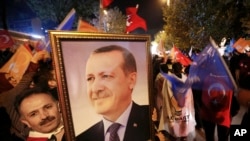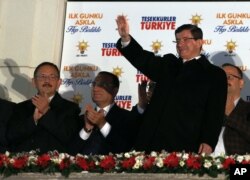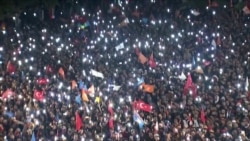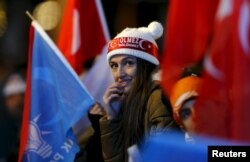Turkish President Recep Tayyip Erdogan said the world should respect the victory of his Justice and Development Party (AKP) in Sunday's snap parliamentary polls, which he described as the people of Turkey voting for stability.
"The whole world must show respect," Erdogan said Monday after attending prayers at a mosque and visiting his parents' graves. "So far I haven't seen such a maturity from the world."
Erdogan's remarks were an apparent reference to the Western media's often critical coverage of his government's policies stifling critics.
Sunday's elections were free and peaceful, but international election observers denounced media restrictions in the run-up to the voting, the government's seizure of an opposition media company and criminal investigations of journalists for allegedly supporting terrorism or defaming Erdogan.
White House spokesman Josh Earnest said Monday that the Obama administration has both publicly and privately raised concerns about "freedom of the press, freedom of speech and freedom of assembly in Turkey." He said the White Housen was "deeply concerned that media outlets and individual journalists critical of the government were subject to pressure and intimidation during the campaign."
Andreas Gross, who headed a delegation of parliamentarians from the Council of Europe, told reporters Monday, "Unfortunately, we came to the conclusion that this campaign was unfair and was characterized by too much violence and by too much fear."
The election returns Turkey to single-party rule just five months after Erdogan's AK Party lost its majority in parliament for the first time in more than a decade. The party won just under 50 percent of the vote to hold 316 seats in the 550-member body.
"The nation chose stability starting from November 1," Erdogan said.
Call for unity
The main opposition Republican People's Party (CHP) won just over 25 percent, giving the AKP a far wider margin of victory than predicted.
Prime Minister Ahmet Davutoglu expressed a desire for unity as he spoke to supporters in Ankara late Sunday. He called for "a new Turkey in which politics are normalized."
"During the campaign process, even if it was inadvertently, if there is one person whose heart we broke, angered or offended, may they give us their blessing," he said.
Davutoglu also renewed calls for a new constitution, something the AKP has sought in order to give Erdogan more executive powers. However, even with the new majority in parliament, the party will still be short of the votes it needs to push through a new constitution on its own.
The AKP victory confounded all the country’s opinion polls. But, after June’s inconclusive election, the news ended months of political uncertainty and bolstered financial markets, with the Turkish lira surging in value. A sluggish economy is among Turkey's major challenges.
Tensions rose
Sunday's vote followed months of rising tensions between the Erdogan government and a loose alliance of pro-Kurdish leftists, feminists and nationalist Kurds. The opposition's indirect links to the outlawed Kurdistan Workers Party (PKK) came under repeated attack from Erdogan and his allies during the run-up to Sunday's balloting.
Hours after the polls closed on Sunday, Erdogan called the election a message to Kurdish insurgents in Turkey's southeast that "violence cannot coexist with democracy."
Along with the main CHP opposition, the liberal pro-Kurdish Peoples' Democratic Party (HDP) and the Nationalist Movement Party (MHP) will also be seated in the next assembly.
In July, the armed wing of the PKK scrapped a three-year cease-fire with Ankara, after Turkish warplanes struck the group's military training bases in northern Iraq while PKK fighters battled Islamic State militants. Ankara also bombed several other PKK bases. Davutoglu said then the attacks would continue "as long as there is a threat against Turkey."
Last month, the Ankara government blamed the PKK for twin suicide bombings at a peace rally in Ankara that killed more than 100 people and wounded about 160 others.
The Erdogan government also is at odds with his Western allies over Syria and the deepening migrant crisis.
Protests erupt
Sunday's vote tallies sparked protests in southeastern Turkey's mainly Kurdish city of Diyarbakir. Government security forces fired tear gas at stone-throwing protesters there as support for the pro-Kurdish opposition hovered close to the 10 percent voter threshold needed to enter the government.
VOA correspondents Luis Ramirez and Dorian Jones contributed to this report from Istanbul.









